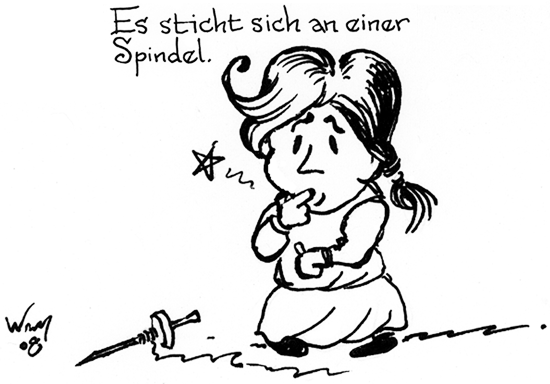Die Reflexiven Verben – The reflexive verbs
Verbs are used to describe actions, and many of them have a direct object or an indirect object, which is affected by the action the verb describes. When the object of the verb is not the same as the subject of that action (the person or thing who performs the action), the sentence has a subject, a verb, and a separate (direct) object.
| Das brave Mädchen setzt die Spindel auf den Boden. | The good girl puts the spindle on the ground. |
| Das Mädchen bringt der Stiefmutter die Spindel. | The girl brings the stepmother the spindle. |
The first sentence has a direct object (die Spindel), the second one has both a direct (die Spindel) and an indirect object (der Stiefmutter).
Verbs with the same subjects and objects
However, if the object of the action is the same as the performer of that action, then you have a reflexive verb on your hands (although this reflexivity is sometimes evident only in German):
| Das brave Mädchen setzt sich auf den Boden. | The good girl sits [herself] down on the ground. |
| Es sticht sich an der Spindel. | She pricks herself on the spindle. |
Usage of reflexive verbs
1. Reflexive verbs can reflect a clear reciprocal relationship between the subject and the direct object (e.g., sich kämmen – to comb one’s self).
| Das brave Mädchen wäscht sich im Brunnen. | The good girl washes [herself] in the well. |
| Später verletzt sich die Stiefschwester absichtlich, damit auch sie Gold kriegen kann. | Later, the stepsister hurts herself intentionally, so that she too can get a lot of gold. |
2. Reflexive verbs can reflect a clear reciprocal relationship between the subject, a direct object and the subject as the indirect object (e.g., ich kämme mir die Haare – I’m combing my hair).
| Ach, genauer gesagt, wäscht sich das brave Mädchen die Hand im Brunnen. | More specifically, the good girl washes [herself] her hand in the well. |
| Und die Stiefschwester sticht sich in den Finger, damit er blutig wird und sie in den Brunnen springen kann. | And the stepsister pricks [herself/her own] her finger, so that it gets bloody and she can jump into the well. |
3. Finally, reflexive verbs can be quite mysterious for English speakers, but there you have it … it’s a different language, and these expressions just need to be memorized (along with the correct reflexive pronoun: accusative or dative).
| Das brave Mädchen sehnt sich nach ihrer Heimat. | The good girl longs [herself ??] for her home. |
| Nachdem sie durchs Tor geht und mit Gold bedeckt war, befindet sie sich ‘oben’ in der Welt. | After she goes through the gate and is covered by gold, she finds herself ‘up’ in the world. |
| Sobald die Stiefschwester das gold-bedeckte Mädchen sieht, entscheidet sie sich, Frau Holle zu besuchen. | As soon as the stepsister sees the gold-covered girl, she decides [herself ??] to visit Frau Holle herself. |
Reflexive pronouns
Except for the third person singular and plural pronouns, reflexive pronouns have the same forms as their regular accusative and dative counterparts.
| Nominativ | Akkusativ | Dativ |
| ich | mich | mir |
| du | dich | dir |
| er/sie/es | sich | sich |
| wir | uns | uns |
| ihr | euch | euch |
| sie/Sie | sich | sich |
Common reflexive verbs – with accusative reflexive pronouns.

| ich bade mich | I take a bath |
| ich bedanke mich | I express my thanks |
| ich beeile mich | I hurry |
| ich befinde mich | I find myself … |
| ich benehme mich | I behave |
| ich beschwere mich über | I complain about |
| ich bewege mich | I move |
| ich bewerbe mich bei | I apply (for a job) at |
| ich dusche mich | I shower |
| ich entschließe mich | I decide |
| ich entschuldige mich für | I apologize for |
| ich entspanne mich | I relax |
| ich erhole mich | I recuperate |
| ich erinnere mich an | I remember |
| ich erkälte mich | I catch a cold |
| ich frage mich | I wonder |
| ich freue mich auf | I look forward to |
| ich freue mich über | I am excited about |
| ich fühle mich wohl | I feel well |
| ich fürchte mich vor | I am afraid of |
| ich gewöhne mich an | I get used to |
| ich informiere mich über | I inform myself about |
| ich interessiere mich für | I am interested in |
| ich irre mich | I am mistaken |
| ich konzentriere mich auf | I concentrate on |
| ich legen mich (hin) | I lay myself (down) |
| ich ruhe mich aus | I am resting |
| ich schminke mich | I put make-up on |
| ich sehne mich (nach) | I long for |
| ich setze mich (hin) | I sit (down) |
| ich verabschiede mich | I take my leave |
| ich verbessere mich | I improve |
| ich verliebe mich in | I fall in love with |
| ich verspäte mich | I am late |
| ich bereite mich vor | I prepare |
| ich stelle mich vor | I introduce myself |
| ich wundere mich | I am amazed |
| ich weigere mich | I refuse |
Common reflexive verbs – with dative reflexive pronouns.

| ich überlege mir | I ponder/think about |
| ich sehe/schaue mir …. an | I am watching |
| ich mache mir Sorgen um … | I am worried about … |
| ich merke mir | I make a note of |
| ich stelle mir vor | I imagine |
| ich wünsche mir | I wish |
Either accusative or dative.
| accusative | dative |
| mich kämmen (comb myself) | mir die Haare kämmen (comb my hair) |
| mich putzen (clean myself) | mir die Zähne putzen (clean my teeth) |
| mich anziehen (get myself dressed) | mir die Socken anziehen (put on my socks) |
| mich umziehen (change my clothes) | mir das Hemd umziehen (change my shirt) |
| mich ausziehen (get myself undressed) | mir den Mantel ausziehen (take off my coat) |
| mich waschen (wash myself up) | mir das Gesicht waschen (wash my face) |
| mich verletzen (hurt myself) | mir den Finger verletzen (hurt my finger) |
| mich rasieren (shave myself) | mir das Gesicht rasieren (shave my face) |


